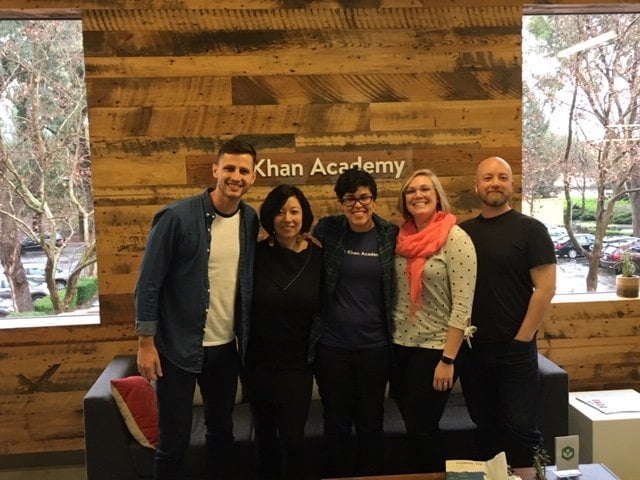Better Than Most is a regular feature of The Business of Giving, examining the best places to work among social good businesses and nonprofit organizations.
Denver: And tonight, you’ll be going to Silicon Valley — Mountain View to be specific and to the offices of Khan Academy, an extraordinary organization that has created a set of online tools and videos to help educate students. It’s also an extraordinary place to work as you will soon hear.
May-Li: I think if you stick with traditional hiring criteria, and you stick with traditional cues of competence, that is how you reinforce the status quo, and things don’t budge. What we’ve done is take a good long look at what our hiring criteria actually is, and decided what nonstarters are. For example, actually figuring out a way to get at questions around collaboration and to get at questions around humility and introspection. I think those things are really hard to teach. Sometimes raw, technical skills are a lot easier to teach than humility and introspection. And I think working in education requires a lot of humility and introspection. It’s certainly easier to learn if you’re humble and introspective. So, we test for those things. I have turned down extremely highly skilled technical candidates because it was clear that they weren’t collaborative.
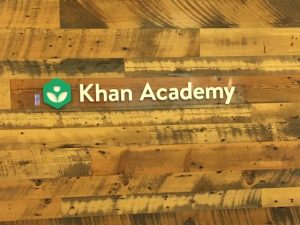 Leah: A part of our interview process on the content team is that you have to write just a piece of content. Then the person who’s interviewing you will give you feedback. In the moment you have to respond to that and say,” I disagree with what you’re saying here,” or “I agree.” And we’re not looking for a particular answer of – Do you disagree? It’s: Are you willing to hear that feedback and say, “Okay, I see where you’re coming from, and this is how I think we should approach it, moving forward.” And I see that in my daily life on the content team; when I get feedback, that’s a thing that I’m thinking about is: How can I use this information to improve, moving forward?
Leah: A part of our interview process on the content team is that you have to write just a piece of content. Then the person who’s interviewing you will give you feedback. In the moment you have to respond to that and say,” I disagree with what you’re saying here,” or “I agree.” And we’re not looking for a particular answer of – Do you disagree? It’s: Are you willing to hear that feedback and say, “Okay, I see where you’re coming from, and this is how I think we should approach it, moving forward.” And I see that in my daily life on the content team; when I get feedback, that’s a thing that I’m thinking about is: How can I use this information to improve, moving forward?
Lizzie: So, there’s some challenges when you come to Khan Academy that I feel like it’s a little different. One of them is that this is a really dynamic product environment where as we’ve talked about before, we’re moving really really fast. That’s not something I was used to where it would take months to really plan let’s say, a program, or something that was going to happen at a museum that I used to work at, would take a long time to plan; where this is something that we’re moving at such a faster pace; that was not something I was used to.
Dave: Then we’ve got all the different tools that we have transparency on, how we got to that decision along the way, so that if we’re onboarding, we’ll have a new person joining the team I will work on in a few weeks, we want to get that person up to speed on our current work but also how we got there and all the decisions made along the way. So, when they pop into a Google doc with our strategy, they can also see the comment threads that we try to leave there even when the discussion’s been resolved, so that you can see the past feedback that has happened and how we got to a certain decision.
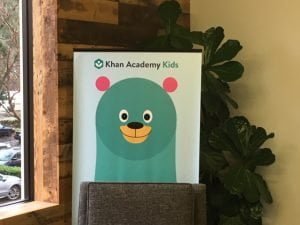 Seth: But sometimes you can’t trust that people have made the time for a pre-read, so we’ll make some sort of document, and then in the first 10 minutes of the meeting, read the doc. Then we’ll debate it. But we’re not going to debate something if you haven’t read about it yet, and we’re not going to try to force you to find magic time to prepare for a meeting beforehand. The meeting will be self-enclosed. “Sit down. Read this thing. Let’s discuss it.” It’s a little harder for introverts, which is one of the levels of inclusion that we want to have, but that is a technology solve that I’ve seen that’s used pretty effectively here.
Seth: But sometimes you can’t trust that people have made the time for a pre-read, so we’ll make some sort of document, and then in the first 10 minutes of the meeting, read the doc. Then we’ll debate it. But we’re not going to debate something if you haven’t read about it yet, and we’re not going to try to force you to find magic time to prepare for a meeting beforehand. The meeting will be self-enclosed. “Sit down. Read this thing. Let’s discuss it.” It’s a little harder for introverts, which is one of the levels of inclusion that we want to have, but that is a technology solve that I’ve seen that’s used pretty effectively here.
May-Li: One of the things that we really are conscientious of is taking space/making space when it comes to airtime. I think traditional meetings… oftentimes the people with the loudest voices in the room get all of the airtime… or get listened to more than others. So, we experiment with techniques of being able to communicate at the same time, but do it nonverbally so that all of the voices get captured; and we’ll do that sometimes using a synchronous document. Or we’ll do it simply by people watching how much people are speaking in the room, and just taking a step back. We call it… the practice is “ make space/take space.” We also encourage people that might be less certain about speaking up… to speak up, even when they are not a hundred percent sure of what they’re going to say yet.
Lizzie: There were words that were used here I had never heard before, like “dogfooding.” I didn’t know what that was. Or how that worked. Or MVP, minimum viable product; that was not a word I had ever used in context before, but this place also gives you the confidence to not know those things and to go up to someone and say, “I don’t actually know what you’re saying. Can you explain that to me?” Or, “How does this work?” where it doesn’t feel like you’re being left out at all; where it’s okay to not know, and you’re able to ask those questions in a safe environment, and that’s been so meaningful.
Leah: I just want to talk about “dogfooding” and what that is. It’s a part of our collaboration process. Before we send anything, any type of product, or sometimes content out to users, we’ll actually in-house “dogfood,” which just means that we’ll have people from all different teams actually try it out first, note any bugs, note any issues that they might see. That’s actually really great as a content creator, where if I’m creating something that’s US Government & Politics, I get to have someone on the Philanthropy team, on the Marketing team come look at it, or on the Engineering team, and it might be not their background, but they can tell me something about, “Okay, this actually read really oddly to me.” Or, “Hey, I really didn’t get the learning objective after this. You might want to think about adding a couple more sentences here.”
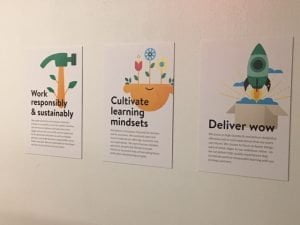 Lizzie: At Khan Academy, our mission is vast and audacious. We want to provide a free, world-class education for anyone, anywhere. And there are so many avenues we could take to actually accomplish that. I think that’s really fascinating and really attractive in a different way than a typical nonprofit that’s really focused on the community that they’re in, which is great. We also have the ability to reach at a global scale.
Lizzie: At Khan Academy, our mission is vast and audacious. We want to provide a free, world-class education for anyone, anywhere. And there are so many avenues we could take to actually accomplish that. I think that’s really fascinating and really attractive in a different way than a typical nonprofit that’s really focused on the community that they’re in, which is great. We also have the ability to reach at a global scale.
I think it has a lot to do with the fact that we really embrace new technology, and we’re trying to move as fast as the sector technology is moving. We are able to make changes on our website. We are able to create content that really hits on certain events that are happening in the world, that maybe it would take a bricks and mortar place… to put on a program… it would take a month or two to even plan it. But we’re able to put something out there a lot quicker and on a platform that others across the world can actually access.
Seth: A really strong part of the culture here at Khan Academy is making sure that we can include all the voices there, and it makes sense from a product standpoint because there are so many – there is every kind of learner that you can think of– and so you want to encourage every different type of voice to become part of the conversation if ultimately you want to create a product that will work for all different kinds of learners and all different kinds of teachers. So we need it. We need to be able to do that well in order to make good product.
May-Li: We have people coming from philanthropy and education. I’ve got people on my team that come from library science and all kinds of different fields, which everybody loves and really embraces those perspectives. I think it’s also part of the learning mindset. We’re like, “How do you think about this? How did you used to do this? Can we make something new and better out of all the different perspectives we bring?”
Dave: And we have a talent show at least once a year. Some people really are talented in that skill, but others are just trying to learn it and have maybe only been learning it for a few months. So, this is their first time playing piano in front of the crowd, or singing in front of the crowd. But it’s that spirit of: “You can learn anything, including the people working at the company can learn anything.” I think that same energy is what we want our users that come on the Khan Academy and approach something that they’re having trouble learning to feel as they start practicing and start learning. That’s a big part of our culture.
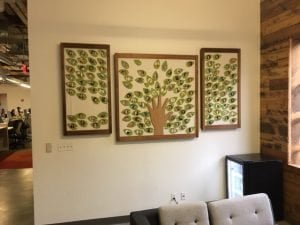 Leah: One really good example of that is our SAT product. We’ve seen students actually succeed on the SAT… grow 150 points if they’re on Khan Academy for 20 hours. And that’s a huge motivator for this entire company, regardless if you’re writing the SAT content, or if you’re doing the engineering. They have to be able to use the product to see that growth. So, it’s a big, proud moment. It’s a big, positive note for us is that we’re actually seeing students succeed on a test that maybe they didn’t have access to prep before; they may not have the money to spend on a prep course. They can do this for free online, on their phones. That’s incredible! And I think that’s one of the most motivating factors for us!
Leah: One really good example of that is our SAT product. We’ve seen students actually succeed on the SAT… grow 150 points if they’re on Khan Academy for 20 hours. And that’s a huge motivator for this entire company, regardless if you’re writing the SAT content, or if you’re doing the engineering. They have to be able to use the product to see that growth. So, it’s a big, proud moment. It’s a big, positive note for us is that we’re actually seeing students succeed on a test that maybe they didn’t have access to prep before; they may not have the money to spend on a prep course. They can do this for free online, on their phones. That’s incredible! And I think that’s one of the most motivating factors for us!
Seth: One of the things that I think makes us different than a legacy organization is that you don’t get to sit there directly with the people that you’re helping. It has to be virtual. You see testimonials and stuff. But then you wear a Khan Academy stuff into the world, I’ve gotten free drinks on airplanes; about one in three lift drivers is like, “Hey, that really helped me through something.” It’s really impressive how much Khan Academy has impacted the world and people really notice if you’re wearing Khan Academy stuff.
Dave: I tell people that I work at Khan Academy because I am really proud of it. I think that there is a lot to be said of just having a lot of pride with what you’re doing day in and day out. That’s a huge perk in my mind also.
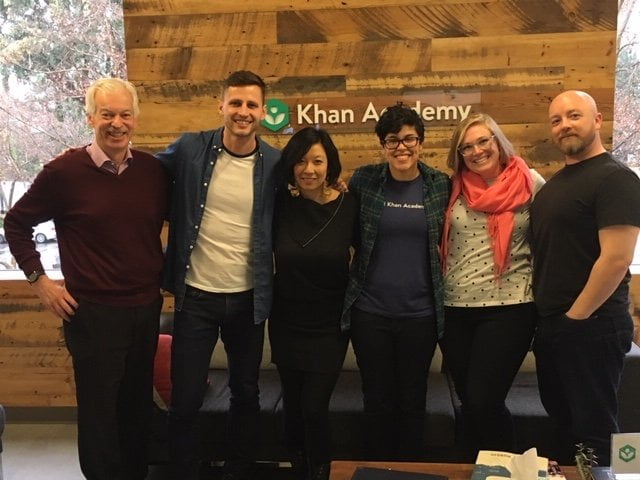
Denver: I would like to thank Rachel Cooke for helping to organize my visit and for all those who participated this piece: May-Li Khoe, Lizzie Rock, Seth Olshfski, Dave Herron, and Leah Cabrera-Marquez. To hear this again, read the transcript or see pictures of the participants and the offices, come visit denver-frederick.com where we have a link to my full interview to Salman Khan, the Founder and CEO of Khan Academy.
The Business of Giving can be heard every Sunday evening between 6:00 p.m. and 7:00 p.m. Eastern on AM 970 The Answer in New York and on iHeartRadio. You can follow us @bizofgive on Twitter, @bizofgive on Instagram and at http://www.facebook.com/BusinessOfGiving

